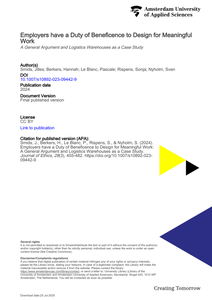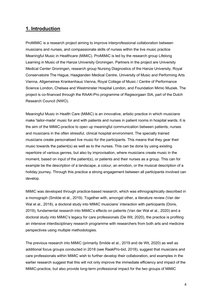Artificial intelligence-driven technology increasingly shapes work practices and, accordingly, employees’ opportunities for meaningful work (MW). In our paper, we identify five dimensions of MW: pursuing a purpose, social relationships, exercising skills and self-development, autonomy, self-esteem and recognition. Because MW is an important good, lacking opportunities for MW is a serious disadvantage. Therefore, we need to know to what extent employers have a duty to provide this good to their employees. We hold that employers have a duty of beneficence to design for opportunities for MW when implementing AI-technology in the workplace. We argue that this duty of beneficence is supported by the three major ethical theories, namely, Kantian ethics, consequentialism, and virtue ethics. We defend this duty against two objections, including the view that it is incompatible with the shareholder theory of the firm. We then employ the five dimensions of MW as our analytical lens to investigate how AI-based technological innovation in logistic warehouses has an impact, both positively and negatively, on MW, and illustrate that design for MW is feasible. We further support this practical feasibility with the help of insights from organizational psychology. We end by discussing how AI-based technology has an impact both on meaningful work (often seen as an aspirational goal) and decent work (generally seen as a matter of justice). Accordingly, ethical reflection on meaningful and decent work should become more integrated to do justice to how AI-technology inevitably shapes both simultaneously.
DOCUMENT

Despite increased interest in experience and experience design in hospitality, tourism, and leisure, the field remains emergent. For experience design to mature in research and practice, clear consensus conceptualization of key constructs, like memorable, meaningful, and transformative experiences, is needed. While existing research identifies emotions as the key to memorable experiences, more conceptual work is needed to understand the unique impact and process behind meaningful experiences. This paper proposes an expanded conceptualization of the impact and process associated with meaningful experiences. We suggest that as individuals reflect on existing experiential (i.e., autobiographical) memories, they can extract insight from those memories. If any of the extracted insights connect with core sources of meaning, then the individuals perceive their experience as meaningful. Suggestions for potential strategies to design for meaningful experiences are also shared.
LINK
This document consists of the research report of Work Package 3 of ProMiMiC's locations Groningen and The Hague. Through the implementation of MiMiC-projects in the form of ‘living labs’, research data was generated leading to insights into (1) concepts of interprofessionality between musicians and healthcare professionals, (2) effects of the MiMiC-practice on nurses’ compassionate skills in contact with patients and (3) the influence of the various contexts on the MiMiC-practice. Given the fact that hospitals are the site of study in ProMiMiC, the research activities of Work Package 3 got highly affected by the COVID-19 pandemic. It led to additional questions and expansion of the MiMiC practice to directions that the consortium hadnot foreseen.--- Update September 2025: Chapter 5 - episodes added as a separate file for open access.
DOCUMENT

Due to their diverse funding sources, theatres are under increasing pressure to demonstrate impact on society. The Raad voor Cultuur (2023) for example advised the secretary of state to include societal impact as an additional evaluation measure next to artistic value. Many theaters, such as the Chassé Theater and Parkstad Limburg Theaters, have reformulated their missions to focus on impact of performances on visitors. This is a profound transformation from merely selling tickets and filling seats, and requires new measurement instruments to monitor, manage, and improve impact. Currently available instruments are insufficient, and effective monitoring is crucial to larger future projects that theaters are currently planning to systematically broaden impacts of performances on their communities. The specific goal of this project is to empower theaters to monitor and improve impact by developing a brief experience impact questionnaire, taking existing data from student projects conducted at the Chassé Theater about performing arts experiences on one hand, and experience impact theory innovations on the other, as starting points. We will develop potential items to measure and benchmark against established measures of valued societal outcomes, such as subjective well-being and quality of life. These will be measured in questionnaires developed with project partners Chassé Theater and Parkstad Limburg Theaters and administered before and after performances across a wide range of genres. The resulting data will enable comparison of new questionnaire items with benchmarked measures of valued societal outcomes. The final product of the project will be a brief impact questionnaire, which within several brief self-report instruments and just a few minutes can effectively be used to quantify the impact of a performing arts experience. A workshop and practice-oriented article will make this questionnaire implementable, thereby mobilizing the key enabling methodology of monitoring and impact measurement in the performing arts sector.
In order to achieve much-needed transitions in energy and health, systemic changes are required that are firmly based on the principles of regard for others and community values, while at the same time operating in market conditions. Social entrepreneurship and community entrepreneurship (SCE) hold the promise to catalyze such transitions, as they combine bottom-up social initiatives with a focus on financially viable business models. SCE requires a facilitating ecosystem in order to be able to fully realize its potential. As yet it is unclear in which way the entrepreneurial ecosystem for social and community entrepreneurship facilitates or hinders the flourishing and scaling of such entrepreneurship. It is also unclear how exactly entrepreneurs and stakeholders influence their ecosystem to become more facilitative. This research programme addresses these questions. Conceptually it integrates entrepreneurial ecosystem frameworks with upcoming theories on civic wealth creation, collaborative governance, participative learning and collective action frameworks.This multidisciplinary research project capitalizes on a unique consortium: the Dutch City Deal ‘Impact Ondernemen’. In this collaborative research, we enhance and expand current data collection efforts and adopt a living-lab setting centered on nine local and regional cases for collaborative learning through experimenting with innovative financial and business models. We develop meaningful, participatory design and evaluation methods and state-of-the-art digital tools to increase the effectiveness of impact measurement and management. Educational modules for professionals are developed to boost the abovementioned transition. The project’s learnings on mechanisms and processes can easily be adapted and translated to a broad range of impact areas.
In het project CW4.0 onderzoeken MKB’ers uit de houtindustrie en Smart Industry samen met de Hogeschool van Amsterdam (HvA), kennispartners TNO, HMC en Bouwlab R&Do en partners in hospitality hoe zinvolle toepassingen te maken van resthout, met behulp van Industry 4.0-principes. Hoogwaardig hout blijft momenteel ongebruikt, omdat het te arbeids-intensief is grote hoeveelheden ongelijkmatige stukken hout van verschillende grootte en houtsoort te verwerken. Waardevol resthout wordt zo waardeloos afval, tegen de principes van de circulaire economie in. CW4.0 richt zich op de ontwikkeling van geautomatiseerde processen voor houtverwerking gebaseerd op Industry 4.0 technologieën - met behulp van digitale ontwerptools en industriële robots. Uit eerdere projecten van HvA en partners is gebleken dat deze processen het gebruik van resthout levensvatbaar kunnen maken, in het bijzonder voor toepassingen in de hospitality sector, bijvoorbeeld voor receptiebalies, hotelmeubilair en interieurdelen. CW4.0 wordt dan ook uitgevoerd in samenwerking met hospitality-ontwerpers en hotelketels. Het onderzoek concentreert zich op 1) het creëren van een digital twin (=digitale kopie van een beoogd object of proces, om dit te onderzoeken zonder het eerst te hoeven bouwen) van een ‘upcycle houtfabriek’; 2) het realiseren en beproeven van secties van de fabriek; 3) het ontwerpen en prototypen van hospitality toepassingen en 4) het evalueren van de business case van deze toepassingen en de fabriek in het algemeen. Na afloop is er kennis beschikbaar voor houtindustrie om afval te verminderen, voor Smart Industry om hun digitale technologieën toe te passen voor upcycling van materialen, en voor horecapartners om waardevolle toepassingen te creëren van resthout. Het project is een belangrijke stap in de opschaling van industriële robotproductie met circulaire materialen. Het legt een nieuwe, belangrijke verbinding tussen Smart Industry en de circulaire transitie, gericht op het aanpakken van urgente maatschappelijke uitdagingen verband houdend met materiële schaarste en de mondiale milieucrisis.